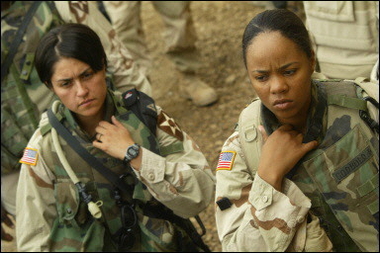Political Minutes: Sexual Assault in the Military, The Invisible War
 UN Women, FemSex, the Barnard Center for Research on Women, and the New York City Civic Engagement Program came together to screen the documentary The Invisible War on Barnard Campus on Wednesday September 12th, which was followed by a panel discussion. The Invisible War depicts for the viewer the rape-culture of the United States armed forces and what some men and women have experienced when trying to deal with this culture in the aftermath of their own attacks. The screening was followed by a question and answer session with Helen Benedict, a professor at the Columbia School of Journalism whose book The Lonely Soldier inspired the making of the movie, and Brigadier General Loree K. Sutton, who was the highest ranking psychiatrist in the United States Army before her retirement two years ago.
Both participated in the movie, which told the stories of soldiers and how the military dealt and reacted to their sexual assault. The women who reported their sexual assault discussed their experience with the system that in which they report to their commanding officer and then are evaluated for how likely they are to have been lying.
UN Women, FemSex, the Barnard Center for Research on Women, and the New York City Civic Engagement Program came together to screen the documentary The Invisible War on Barnard Campus on Wednesday September 12th, which was followed by a panel discussion. The Invisible War depicts for the viewer the rape-culture of the United States armed forces and what some men and women have experienced when trying to deal with this culture in the aftermath of their own attacks. The screening was followed by a question and answer session with Helen Benedict, a professor at the Columbia School of Journalism whose book The Lonely Soldier inspired the making of the movie, and Brigadier General Loree K. Sutton, who was the highest ranking psychiatrist in the United States Army before her retirement two years ago.
Both participated in the movie, which told the stories of soldiers and how the military dealt and reacted to their sexual assault. The women who reported their sexual assault discussed their experience with the system that in which they report to their commanding officer and then are evaluated for how likely they are to have been lying.
The panel discussion began with both panelists talking about their experiences before the movie. Benedict discussed the reactions she had been getting from critics telling her she was a liar and how she was seen as a traitor for disparaging the military with her journalism.
Sutton discussed how she took part in the making of this film after her 29 year service in the United States Army because she felt that this film was not an anti-military film, but instead “a way for those who had no voice to have a voice” and be heard. She believes that this film is a platform to launch the kind of change that hopefully will help the military move forward from its current practices.
Many audience members asked important questions during this discussion period, including “Is the shame in the military shifting?” and “Why can’t military personnel report their rape to the police if going to their commanding officer does not work?” The panels answers to both questions were disheartening and very military specific, in that shame is developing very slowly as does all change that comes to the military and that as civilian police are not found in a war zone they are not part of the process.
One student asked Benedict “What inspired you to write your first book?” She responded that she went to a meeting at CUNY for veterans returning from tours in Iraq and approached some of the attendees who were not in uniform to hear their stories. The struggle these young women who have served our country related to her is what inspired her. She particularly recalled in vivid detail one woman’s statement that “In the military, the men only let you be one of three things: a bitch, a ho, or a dyke.”
At the end of the panel discussion Nancy Schwartzman introduced her smartphone application Circleof6. This free application is intended to help prevent sexual assault by creating another way to contact people for help. This application’s was a winner of the Apps Against Abuse Technology Challenge begun by Vice President Joe Biden with the hope that in a world where one in five college women are sexually assaulted this application will be able to help protect women from such situations.

